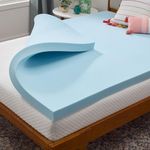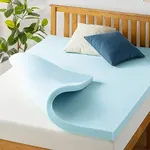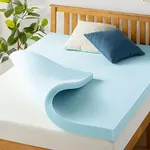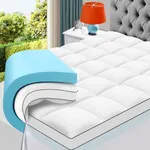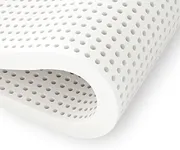Buying Guide for the Best Foam Mattress Toppers
Choosing the right foam mattress topper can significantly improve your sleep quality by providing additional comfort and support. When selecting a foam mattress topper, it's important to consider several key specifications to ensure you find the best fit for your needs. Understanding these specifications will help you make an informed decision and enhance your overall sleeping experience.MaterialThe material of a foam mattress topper is crucial as it determines the comfort, support, and durability of the topper. Common materials include memory foam, latex foam, and polyurethane foam. Memory foam is known for its contouring properties and pressure relief, making it ideal for those with joint pain or who prefer a hugging sensation. Latex foam is more responsive and cooler, suitable for those who want a bouncier feel and better temperature regulation. Polyurethane foam is generally more affordable and offers decent support but may not be as durable. Choose the material based on your comfort preference and any specific needs like pain relief or temperature control.
ThicknessThe thickness of a foam mattress topper affects the level of support and comfort it provides. Toppers typically range from 1 to 4 inches in thickness. A 1-2 inch topper adds a slight layer of comfort and is suitable for those who want to enhance the feel of their mattress without significant change. A 3-inch topper offers a balance of comfort and support, ideal for most sleepers. A 4-inch topper provides maximum cushioning and support, perfect for those with heavier body weight or who need extra pressure relief. Consider your current mattress condition and your personal comfort needs when choosing the thickness.
DensityDensity refers to the weight of the foam per cubic foot and is an indicator of the topper's durability and support. Higher density foam (4-5 lbs/ft³) offers better support and longevity, making it suitable for those who need more substantial support or have a heavier body weight. Medium density foam (3-4 lbs/ft³) provides a good balance of comfort and support, suitable for most sleepers. Lower density foam (2-3 lbs/ft³) is softer and less durable, ideal for those who prefer a plush feel and are lighter in weight. Choose the density based on your support needs and how long you want the topper to last.
FirmnessFirmness determines how soft or hard the mattress topper feels. It ranges from soft to extra firm. A soft topper is ideal for side sleepers who need cushioning for their shoulders and hips. A medium firmness topper is suitable for back sleepers, providing a balance of support and comfort. A firm topper is best for stomach sleepers or those who need extra support to maintain proper spinal alignment. Consider your sleeping position and any specific comfort preferences when selecting the firmness level.
Temperature RegulationTemperature regulation is important for maintaining a comfortable sleep environment. Some foam mattress toppers are infused with cooling gel or have open-cell structures to enhance airflow and dissipate heat. If you tend to sleep hot, look for a topper with cooling features to prevent overheating. Conversely, if you often feel cold at night, a standard memory foam topper without cooling additives may help retain warmth. Choose a topper based on your typical sleep temperature and any specific cooling or warming needs.
Allergies and SensitivitiesIf you have allergies or sensitivities, it's important to choose a hypoallergenic foam mattress topper. Natural latex toppers are often hypoallergenic and resistant to dust mites and mold. Some memory foam toppers are also treated to be hypoallergenic. Check for certifications like CertiPUR-US, which ensures the foam is free from harmful chemicals and safe for sensitive individuals. Consider your allergy and sensitivity needs when selecting a topper to ensure a healthy sleep environment.




